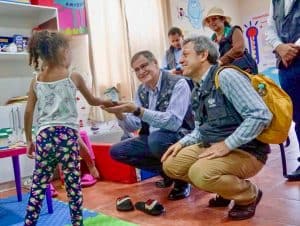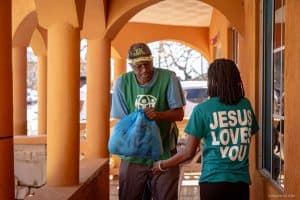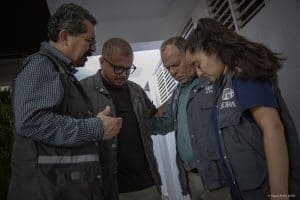It is wonderful to connect about something so close to our hearts: the mission of the Seventh-day Adventist Church. When we talk about our Church, we often think about spreading the good news, sharing our beliefs and looking forward to Jesus’ return. However, there has been a perception that the work of the Adventist Development and Relief Agency (ADRA) and the church’s mission are separate, with ADRA focusing on humanitarian work and the church on evangelism. This can lead to working independently, missing the full power of God’s call. The truth is, there is only one gospel, one Body, one Lord, one faith, and both ADRA and the Church are meant to contribute to and complete this single mission together (see Ephesians 4:4-13). Without ADRA’s work, the Church’s mission would lack a vital dimension. This is not just about charity; it is about fulfilling the “wholistic gospel and the great commission” foundational to Adventists.
The Great Commission: More than just go and preach
Our understanding of the “Great Commission” often starts with Matthew 28:18-20: “Therefore go and make disciples of all nations, baptising them in the name of the Father and of the Son and of the Holy Spirit, and teaching them to obey everything I have commanded you. And surely I am with you always, to the very end of the age.”
This passage is rightly considered the key summary of the mission for all followers of Jesus and the Church. In Adventist understanding, particularly with our focus on Revelation 14:6-12, this commission underpins the proclamation of the everlasting gospel. However, this commission is not just a future mission statement, but a summary of Jesus’ entire gospel story—His identity, purpose and reason for coming. Jesus wasn’t giving a new mission; He was referring back to His ongoing ministry of making disciples and teaching them to obey. The Great Commission, therefore, must be read in the context of Jesus’ full story in Matthew’s gospel, both practically and theologically.
Jesus’ practical ministry: the foundation of our mission
To grasp the Great Commission fully, we must revisit Matthew 10, where Jesus gave His 12 disciples authority for a “training run”. He instructed them: “Go rather to the lost sheep of Israel. As you go, proclaim this message: ‘The kingdom of heaven has come near.’ Heal the sick, raise the dead, cleanse those who have leprosy, drive out demons. Freely you have received; freely give” (Matthew 10:6-8). The disciples were mandated to heal, bring life, restore, overcome evil and serve generously, making a profoundly practical difference by responding to physical needs. This was an extension of Jesus’ ministry, driven by compassion. Jesus highlighted His practical actions when John the Baptist questioned His identity: “Go back and report to John what you hear and see: The blind receive sight, the lame walk, those who have leprosy are cleansed, the deaf hear, the dead are raised, and the good news is proclaimed to the poor” (Matthew 11:4,5). For Jesus, this focus on help and healing for the “least of these”, driven by compassion, was powerful evidence of His Messiahship. Ellen White summarises this as “Christ’s method”:
“Christ’s method alone will give true success in reaching the people. The Saviour mingled with men as one who desired their good. He showed His sympathy for them, ministered to their needs, and won their confidence. Then He bade them, ‘Follow Me’. There is need of coming close to the people by personal effort. If less time were given to sermonising, and more time were spent in personal ministry, greater results would be seen. The poor are to be relieved, the sick cared for, the sorrowing and the bereaved comforted, the ignorant instructed, the inexperienced counselled. We are to weep with those that weep, and rejoice with those that rejoice” (The Ministry of Healing, p143).
This practical mission training equipped the disciples for the Great Commission, underscoring that proclaiming God’s kingdom means embodying it through acts of compassion and service.
The ethical and theological core: justice, mercy and faithfulness
Beyond practical actions, the Great Commission also refers to Jesus’ teachings. At the heart of this is the Sermon on the Mount (Matthew 5-7), which outlines His kingdom’s values, including blessings for the poor, oppressed, and those who seek justice, practise mercy, and are active in reconciliation and peacemaking. This sermon urged personal righteousness, seeking justice, serving others and loving enemies.
Jesus condemned religious people who neglected these ethical components, famously rebuking the Pharisees: “Woe to you, teachers of the law and Pharisees, you hypocrites! You give a tenth of your spices—mint, dill and cumin. But you have neglected the more important matters of the law—justice, mercy and faithfulness” (Matthew 23:23). This profound statement highlights that, in Jesus’ teaching—and indeed throughout the Bible—care for the poor and those who suffer injustice was at least equally important as the personal practices of righteousness.
Jesus’ teaching about the end of the world in Matthew 24 and 25 further illuminates His commission. He linked the signs of His coming to how His disciples serve others, especially those in need, revealing that His true people demonstrate compassion for “the least of these”. His profound reply: “Truly I tell you, whatever you did for one of the least of these brothers and sisters of mine, you did for me” (Matthew 25:40). This means that to be truly “Adventist” is to serve Jesus in the form of practical care for those most in need in our communities and our world. This compassion extends to all humanity, as Ellen White clarifies: “Heaven looks upon us as ‘brothers to sinners as well as to saints,’ and ‘every deed of kindness done to uplift a fallen soul, every act of mercy, is accepted as done to Him’” (The Desire of Ages, p638).
ADRA’s indispensable role in our unified mission
Understanding the Great Commission as Jesus’ holistic ministry and compassion means we are called to genuinely, practically and intentionally seek the good of those in our communities and worldwide. In doing so, we are not just performing good deeds—we are serving, honouring and proclaiming Jesus. This includes:
- Providing healing
- Seeking justice
- Breaking the chains of oppression
- Making peace
Through these ways, we are “preaching the good news to the poor”. Inviting people to become disciples of Jesus is an invitation to join this “greater commission”, initiating them into this “transcendent kingdom” and teaching them the “ethics of the people of God”.
This profound understanding leads to an undeniable conclusion: “The mission of ADRA is the mission of the Church; the mission of the Church is the mission of ADRA—and this one mission is the mission of Jesus. This is our greater commission.”
While ADRA and the Church may fulfil this mission in differing ways and using a variety of methods, their fundamental purpose is unified. ADRA is not a separate entity doing something “other” than the Church’s mission. Instead, it is an essential arm of the Seventh-day Adventist Church, providing a crucial and practical dimension to our collective efforts to fulfil the Great Commission. It embodies the very compassion and practical ministry that Jesus demonstrated and commanded, making it an indispensable part of our “wholistic gospel” outreach.
Therefore, we should recognise ADRA not as an “add-on” or a separate charity, but as an integral, vital and indispensable part of the Seventh-day Adventist Church’s unified mission to serve, honour and proclaim Jesus to a world in need, both physically and spiritually. By supporting ADRA, we actively participate in the very heart of the Great Commission, just as Jesus intended.
Author: Denison Grellman, ADRA Australia CEO
Written with assistance from Nathan Browne, Signs Publishing
Original Link: https://record.adventistchurch.com/2025/10/01/united-in-the-great-commission/







